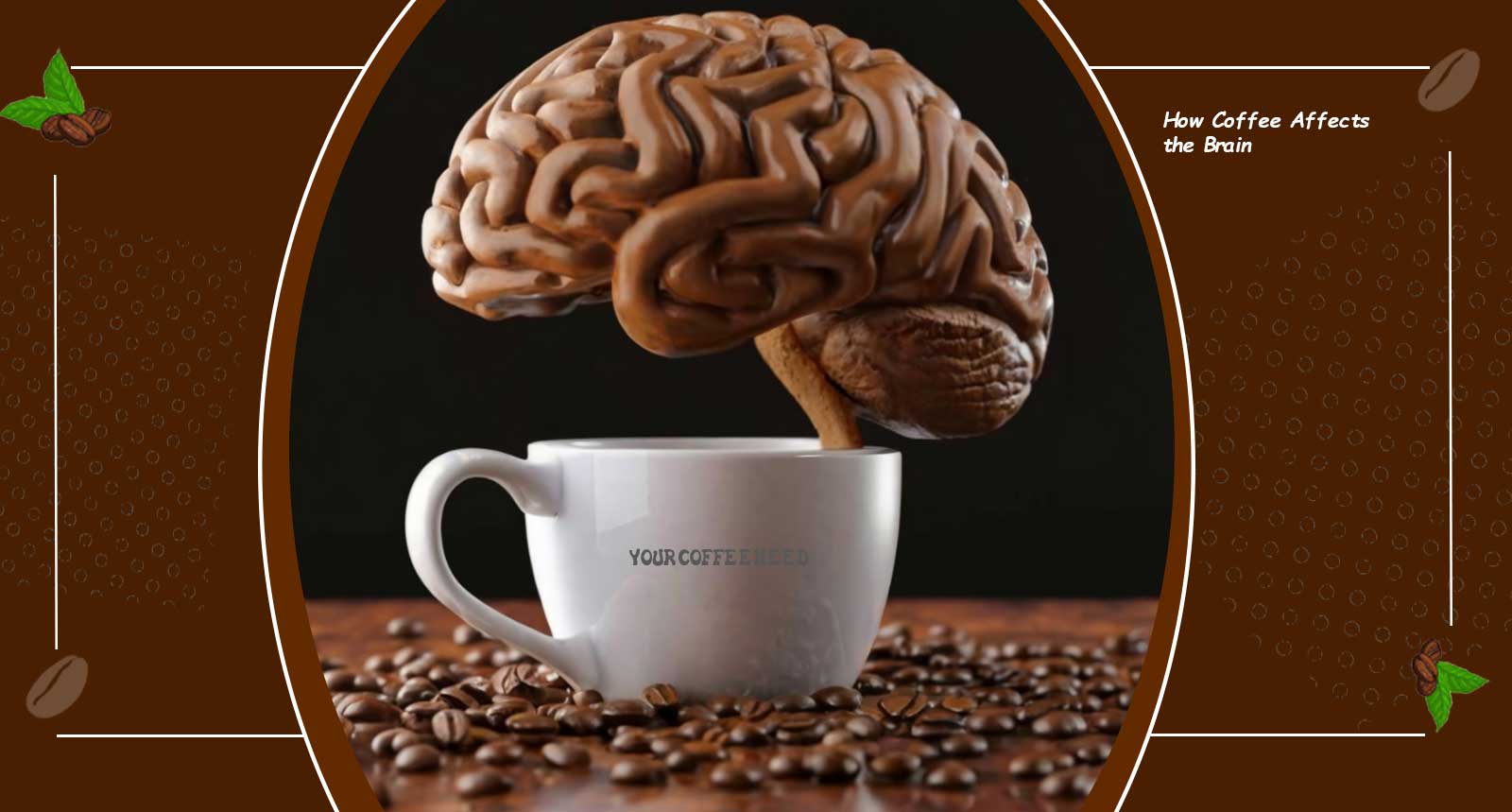In the realm of neuroscience and everyday life, the question of how coffee affects the brain remains a topic of considerable interest and intrigue.
Through scientific inquiry and anecdotal evidence, researchers and coffee enthusiasts alike seek to comprehend the profound ways in which this beloved beverage interacts with the intricate workings of the human mind.
The mechanisms behind coffee’s influence offers valuable insights into cognition, alertness and overall brain health.
Negative Effects of Coffee on Brain Health
Disrupted Sleep Patterns
Excessive coffee intake can disrupt natural sleep cycles, leading to sleep deprivation and impaired cognitive function.
Increased Anxiety
High levels of caffeine in coffee may exacerbate feelings of anxiety and contribute to heightened stress levels.
Dependency and Withdrawal
Regular coffee consumption can lead to dependence, with withdrawal symptoms such as headaches and irritability when coffee intake is reduced.
Jitters and Nervousness
Overconsumption of coffee may result in jitteriness, nervousness and difficulty concentrating.
Heart Rate and Blood Pressure
Elevated heart rate and blood pressure are common side effects of consuming too much caffeine, potentially impacting brain health over time.
Gastrointestinal Discomfort
Coffee’s acidic nature can cause gastrointestinal discomfort, including acid reflux and upset stomach.
Dehydration
Coffee is a diuretic, which can lead to dehydration if consumed in large quantities, potentially affecting brain function.
Bone Health
Excessive coffee consumption has been linked to reduced calcium absorption, which may negatively impact bone density and overall health.
Mood Swings
Fluctuations in caffeine levels can contribute to mood swings, affecting emotional stability and overall well being.
Risk of Addiction
Regular consumption of coffee can lead to addiction, with potential long term consequences for brain health and overall quality of life.
Positive Effects of Coffee on Brain Function
Improved Focus and Alertness
The caffeine in coffee stimulates the central nervous system, enhancing focus, attention and alertness.
Enhanced Memory Retention
Research suggests that moderate coffee consumption may improve memory retention and cognitive function, aiding in information recall and learning.
Mood Elevation
Coffee consumption has been associated with increased levels of dopamine and serotonin, neurotransmitters that promote feelings of happiness and well being.
Reduced Risk of Neurodegenerative Diseases
Studies indicate that regular coffee drinkers may have a lower risk of developing neurodegenerative diseases such as Alzheimer’s and Parkinson’s.
Boosted Mental Performance
Coffee can enhance cognitive performance, including reaction time, decision making, and problem solving abilities.
Antioxidant Protection
Coffee is rich in antioxidants, which help combat oxidative stress and protect brain cells from damage caused by free radicals.
Enhanced Physical Performance
Caffeine in coffee can improve physical performance by increasing adrenaline levels, mobilizing fatty acids and enhancing muscle contraction.
Improved Mood Regulation
Coffee consumption has been linked to reduced risk of depression and improved mood regulation, fostering a positive outlook on life.
Promotion of Neuroplasticity
Coffee compounds like chlorogenic acid may promote neuroplasticity, the brain’s ability to adapt and reorganize neural connections.
Longevity Benefits
Some studies suggest that moderate coffee consumption is associated with increased longevity and reduced risk of premature death from various causes.
Is Coffee Good OR Bad For the Brain?
Coffee’s impact on the brain isn’t inherently good or bad; rather, it depends on various factors including dosage, frequency of consumption, individual sensitivity and overall lifestyle.
In moderate amounts, coffee can offer several benefits to brain function such as increased alertness, improved focus and potential protection against neurodegenerative diseases. The caffeine in coffee acts as a stimulant, enhancing cognitive performance and mood.
However, excessive consumption of coffee can lead to negative effects such as disrupted sleep patterns, increased anxiety and dependency. It may also exacerbate certain health conditions and contribute to dehydration if not balanced with adequate hydration.
Ultimately, moderation is key. For many individuals, enjoying coffee in moderation can be part of a healthy lifestyle and may even offer cognitive and health benefits. However, it’s essential to be mindful of personal tolerance levels and to balance coffee consumption with a well rounded diet and lifestyle.
Consulting with a healthcare professional can provide personalized guidance regarding coffee intake and its effects on brain health.
Can Coffee Cause Mental Health Issues?
Coffee consumption, particularly in excessive amounts, has been associated with certain mental health issues, although individual responses can vary widely. Here are some considerations regarding coffee and mental health.
Anxiety and Panic Disorders
Coffee contains caffeine, a stimulant that can exacerbate anxiety symptoms in some individuals. Excessive caffeine intake may increase feelings of nervousness, restlessness and even trigger panic attacks in susceptible individuals.
Sleep Disorders
Consuming coffee, especially later in the day, can interfere with sleep patterns and contribute to insomnia or disrupted sleep quality. Sleep disturbances can have significant impacts on mental health, leading to mood disturbances, irritability and decreased cognitive function.
Dependency and Withdrawal
Regular consumption of coffee can lead to dependency, where individuals may experience withdrawal symptoms such as headaches, fatigue, irritability and mood changes when they reduce or stop coffee intake abruptly. These symptoms can impact mental well being and overall quality of life.
Impact on Bipolar Disorder
Some research suggests that caffeine consumption may affect individuals with bipolar disorder, potentially triggering manic episodes or exacerbating mood swings. It’s essential for individuals with bipolar disorder to monitor their caffeine intake and discuss any concerns with their healthcare provider.
Interaction with Medications
Coffee can interact with certain medications used to treat mental health conditions, such as antidepressants and mood stabilizers. It’s important for individuals taking these medications to be aware of potential interactions and consult with their healthcare provider regarding caffeine consumption.
While moderate coffee consumption is generally considered safe for most individuals and may even offer cognitive and mood benefits, it’s crucial to be mindful of personal tolerance levels and potential sensitivities.
Individuals with pre existing mental health conditions should consider monitoring their caffeine intake and its effects on their well being, seeking guidance from healthcare professionals as needed.
Conclusion
The relationship between coffee and the brain is multifaceted, with both positive and negative effects depending on various factors. Moderation emerges as the key theme, highlighting the importance of mindful consumption and individual tolerance levels.
By understanding the nuances of coffee’s impact on cognitive function, individuals can make informed choices to optimize their brain health and overall well being.
Embracing moderation, awareness and balance fosters a harmonious relationship between coffee consumption and brain function, the potential for enhanced cognition and vitality.
Through ongoing research and personal reflection, individuals can navigate the complexities of coffee consumption to harness its benefits while mitigating potential drawbacks. As science continues to unravel the mysteries of how coffee affects the brain, maintaining a balanced approach remains paramount for promoting optimal cognitive function and quality of life.

